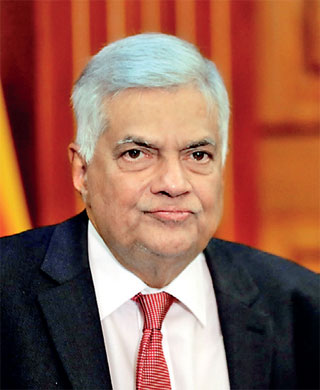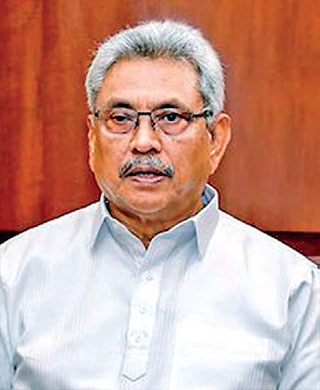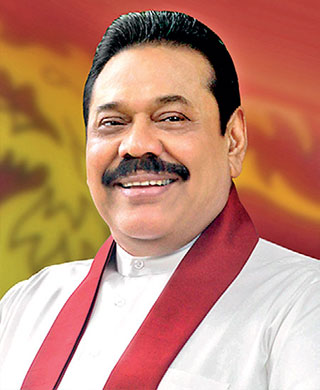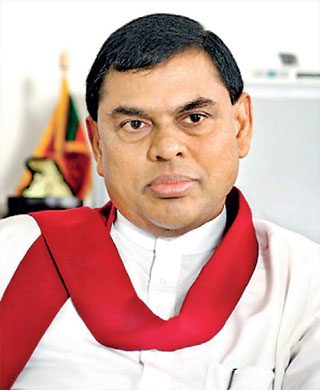Friday Feb 13, 2026
Friday Feb 13, 2026
Wednesday, 4 January 2023 00:00 - - {{hitsCtrl.values.hits}}

President Ranil Wickremesinghe

Gotabaya Rajapaksa

Mahinda Rajapaksa

Basil Rajapaksa
“Ranil Wickremesinghe is a tool...”
– Deputy Minister Sanath Nishantha (Interview – 2.1.2003)
|
By Tisaranee Gunasekara
The first breach was a hoot.
One year ago, Gotabaya Rajapaksa was booed when his convoy passed a milk powder queue in Mirihana. Rajapaksa went off in a huff. Within minutes, the police arrived in force, dispersed the people who had been waiting for hours to buy milk powder and forced the shop to close.
That unprecedented hoot was an omen of the popular uprising that would hound Gotabaya Rajapaksa from the presidency just seven months later. Had he paused to consider hoot’s ominous message, instead of giving into his outraged sensibilities, he may not be reduced to pleading with the US to restore his citizenship now.
Some turning points can be comprehended only with hindsight. Others are identifiable in real time. Like President Wickremesinghe’s plan to increase electricity rates, again, by a massive 50%. It is the kind of measure that would devastate the people economically and the rulers politically. And wide open a door to another coalition of anger (as in April-July 2022) transcending racial, religious, and class barriers.
Interestingly, the resistance to the rate increase is being spearheaded not by the Opposition but by the chairman of the Public Utilities Commission (PUCSL). Janaka Ratnayake is a Rajapaksa acolyte-businessman; he seemed to have been awarded this chairmanship not because of qualification or capacity, but because of the favours he rendered Candidate Gotabaya. With the Opposition focused on demanding LG elections, opposing direct taxes, or driving buses, Ratnayake is free to dress for Lone Ranger, taking on the outlaw-president in a do-or-die duel.
Would Ratnayake, a businessman, take such a pugnacious stand publicly, on his own initiative and without serious political backing? Given the Opposition’s scant attention to the issue, any backing is likely to come from only one source, the Rajapaksas.
Financial imperatives might make an electricity hike unavoidable. If so, a more gradual approach will be less disruptive economically and destabilising politically. If President Wickremesinghe persists in pushing through the 70% increase, he may end up by electrocuting not just the Lankan public and the economy, but also himself.
The irony is that the public mood has begun to improve in November according to multiple indicators. Hope is raising its head slowly. According to the latest survey by the Institute of Health Policy (IHP), the Index of Consumer Expectation increased by 18 points, from 11 in October to 29 in November. This was driven by a more optimistic outlook on personal and national prospects. Confidence in personal financial situation and the country’s situation for the next 12 months both increased in November. Confidence in the country’s long-term prospects (for the next five years) increased even more significantly (from 13 in October to 35 in November). “These improvements mean that future expectations and overall consumer sentiment are now at their highest levels in more than a year and higher than at any time since the economic crisis hit,” the IHP commented (https://ihp.lk/publications/docs/SLOTSReport202216.pdf).
This psycho-emotional improvement is confirmed by the LMD Nielsen Business Confidence survey. According to a report in the Daily FT, “Optimism is on the rise again,” with 21% of businesspeople thinking the economy will do better in the next 12 months, up from 14% in October. The slight increase in November foreign remittances and the more than slight increase in tourist arrivals are other positive signs.
If the proposed electricity hike goes through, it will fracture this mood of cautious optimism by dealing a body blow to householders and businesses. Many families will be forced to return to the bottle-lamp era (kuppi-lampu). Many small and medium enterprises will be pushed to the wall, some even into bankruptcy. This is the road not to greater stability but to renewal of ferment.
|
Comeback kids?
Mahinda Rajapaksa should be made the prime minister again. So said Basil Rajapaksa in a December 24th interview with a Sinhala paper. Rajapaksa is not just expressing a personal wish or the SLPP stance. He is indicating a possible pathway for the family to return to real power. Make Mahinda Rajapaksa the PM to save the Motherland: that rings familiar.
The objective conditions which paved the way for the Wickremesinghe-Rajapaksa partnership have almost ended. The country is largely stable. The Rajapaksas are feeling emboldened, not without reason. According to the IHP’s new opinion tracker survey, “Gotabaya Rajapaksa’s ratings may have started to recover from the deep lows (-80%) they maintained for most of the year...” He is now less unpopular than either Sajith Premadasa or Anura Kumara Dissanayake. Quite a feat for someone who bankrupted the nation.
Two compelling factors could cause serious fissures in the Wickremesinghe-Rajapaksa partnership in the coming weeks and months. Ranil Wickremesinghe was a tool to be used against Aragalaya, as deputy minister Sanath Nishantha (he of oxygen-fame) said in a carefully choreographed interview with another Rajapaksa acolyte, the singer Iraj Weeraratne. Now the tool’s work is done. The time may be coming to put him away. After all, the Rajapaksas do have a long unbroken history of using and discarding human tools, ranging from Mangala Samaraweera to Wimal Weerawansa. Their relationship with anyone outside the family is based not on emotions or notions of loyalty, but on use value alone.
As Ranil Wickremesinghe consolidates his position as president, he seems to be dancing less and less to Rajapaksa tunes. He pushed through the 21st Amendment, against Rajapaksa will. The cabinet expansion the Rajapaksas have been demanding for months is yet to happen (end-January is the new date, according to some reports). Other concerning developments would include Gotabaya Rajapaksa being summoned by the Bribery Commission over the sugar scam (the overnight reduction of sugar taxes from Rs. 50 to 25 cents) and the recent arrest of the chairman of the Beliatta Pradesheeya Sabha (a Rajapaksa faithful) for stealing several lengths of GI water pipes. A number of SLPP parliamentarians are reportedly unhappy about new OIC appointments, made according to proper procedure. They want their own policemen in their areas.
|
Patron-client relationships play a significant role in South Asian politics. Rajapaksa edifice is built on these equations; perks, positions, and impunity in return for absolute and unconditioned obedience. The success of the Rajapaksas project depends in part on the family’s ability to deliver these ‘goodies’ to their enforcers and foot-soldiers. Since his appointment as president, Wickremesinghe has been chipping away at the Rajapaksa capacity to deliver.
This process of incremental weakening is likely to gather steam once the President gains the constitutional ability to dissolve the parliament. If from May to July, the Rajapaksas played the role of senior partners, from March that role will accrue to President Wickremesinghe. He will then own the Sword of Damocles which, at the commencement of their partnership, belonged solely to the Rajapaksas. Then he had to serve their pleasure. Post-February, the roles will be reversed, a position of inferiority anathema to the Rajapaksas.
According to the IHP survey, economic crisis and inflation are the top public concerns at 73% and 41%. The proposed electricity rates hike will be unpopular on both counts. For the Rajapaksas to resume their journey to voters’ hearts and minds, could there be a better issue than a refusal to electrocute the public? If Wickremesinghe persists in trying to push his electrocuting proposal through, the SLPP could either publicly declare its opposition or do closed-door deal, cabinet expansion for rates hike. Either outcome would help Rajapaksa brand, the first with people in general, the second with their activist base.
The SLPP was formed as a quintessentially Rajapaksa party. Its credo was unquestioning obedience to familial orders and uncomplaining acquiescence in familial whims. When the 21st Amendment was proposed, the Rajapaksas were confident of defeating it. They had the numbers. Yet, the unthinkable happened. Wickremesinghe breached the Rajapaksa fortress. The acolytes revolted and the Rajapaksa lost control of a substantial segment of their very own family party, however momentarily.
Given this history, Basil Rajapaksa would want to ensure that the dissolution of Wickremesinghe-Rajapaksa partnership happens in conditions favourable to the Family. By insisting on a second massive electricity rate hike, by making the proposal his own, Wickremesinghe has presented the Rajapaksas with just such a dream issue. Now Basil Rajapaksa will be able to rally straying SLPP parliamentarians to his side. After all, which SLPP parliamentarian would want to justify that rate hike to his/her incensed electorate?
|
Realignments
Contrary to allegations by some Opposition parliamentarians, it is not the absence of an election that is delaying the IMF deal. The fly in the ointment is China.
Debt restructuring generally involves the creditors collectively taking a haircut – either a reduction in principle or in interest income. The average haircut could range from 13% (Uruguay) to 73% (Argentina in 2005).
China is totally opposed to such an arrangement. Given its high levels of debt-exposure via the crazily ambitious Belt and Road Initiative, it needs to make defaulting look and feel extremely hard to the point of tortuous to its debtors. Sri Lanka is probably being turned into an example, a neon Beware sign, warning other potential defaulters about the unacceptably high politico-economic-social costs of defaulting.
As The Economist pointed out, “Sri Lanka will be a critical test of Chinese willingness to co-ordinate with other lenders... China wants to be prioritised and favours negotiating debt relief bilaterally; many of its loan contracts include clauses to that effect.” China has indeed proposed such a bilateral deal (instead of the multilateral agreement the IMF is insisting on). Beijing will give us a new loan to pay back the old loan. If Colombo agrees, any hope of an IMF bailout or a sustainable debt restructuring will vanish. Each creditor nation/financial institution will seek to gain maximum benefit for itself by squeezing Sri Lanka hardest. No reasonable government would want to risk such a path, even if debt restructuring and an IMF bailout get pushed back indefinitely.
The only possible exception would be the Rajapaksas. In the past, the family has proved willing to ink deals deleterious to the country, so long as there was some benefit (real or imaginary) for them.
All China may have to do is wait.
The IMF is pushing hard for a global sovereign debt roundtable. China is said to have agreed. During her recent visit to China, the IMF chief reportedly focused on “the need to accelerate debt relief for countries like Zambia and Sri Lanka.” China has made a preliminary deal with Zambia. Unfortunately, geo-political factors might make Lanka’s problems more intractable. If and when Beijing agrees to a deal, it is likely to come at a significant cost to Sri Lanka’s already eroded sovereignty and its relations with both India and Japan.
(A necessary digression: President Wickremesinghe recently said that his government has offered the East Container Terminal to Japan again and is awaiting word from Tokyo. A previous deal with Japan and India, made in 2019, was scuttled by the Rajapaksas in 2021, ostensibly as a response to protests by trade unions and monks.)
Sri Lanka is living through a time of “pain caused by a revolution gone sour” (Other Septembers – Ariel Dorfman). The excesses of the Aragalaya and President Wickremesinghe’s own excessive responses had fragmented the non-Rajapaksa political space. We are more disunited today than we were in 2015 when Mahinda Rajapaksa was defeated electorally, twice. When the Rajapaksas turn on him, Wickremesinghe may well find himself friendless. The Opposition will watch his demise in glee, not realising their turn will be next.
The defiant times are over, for now. But they can return, if Wickremesinghe tries to push through extreme measures. Like the electricity rate hike, which can enable a broad coalition of monks and priests (these talk as if electricity had been a staple of religious life since the time of the Buddha and the Christ), professionals dissatisfied at having to pay their share of taxes, state sector trade unions fighting to retain their privileges and the electrocuted masses. Such a coalition will be tailor-made not for the Opposition but for the Rajapaksas.
Leaders don’t fail alone. Their failures generally have a greater and more lasting deleterious effect on their countries. Gotabaya Rajapaksa, the main author of Sri Lanka’s fall, was photographed last month spending a comfortable family holiday in Dubai. Meanwhile, many of 6.9 million who had faith in him are struggling to make ends meet. He lost much, but less so than the country and the people.
The Mirihana milk queue is back, a long line of people waiting for a packet or two of milk powder. We still live in fragile times. Anything can happen, again. History, when it repeats itself, may do so not only as tragedy and comedy, but also as tragedy and even greater tragedy.